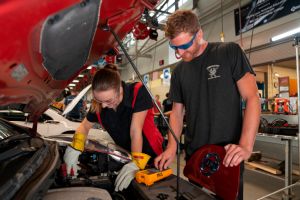
The National Science Foundation (NSF) annually funds approximately 12,000 new awards, with an average funding duration of three years. Each year some of those new awards are supported by the ATE Program, which focuses on improving and expanding educational programs for skilled workers in high-tech STEM fields. ATE grantees concentrate on a range of fields, including advanced manufacturing, agriculture and environment, bio and chemical, information and security, and micro and nanotechnologies and are based primarily at two-year institutions across the nation. This year we wanted to celebrate our new grantees by highlighting four newly funded projects from the 2022 funding cycle.
Access to Careers in Advanced Building Technology
The Milwaukee Area Technical College created this project to connect underserved populations with education and careers in advanced building technology. Access to Careers in Advanced Building Technology's goals are to meet the industry's need for skilled technicians and increase the recruitment and retention of underrepresented students. They plan on doing this in collaboration with the City of Milwaukee and local industry partners. Building needs in Milwaukee and the larger area face numerous challenges, including increased health concerns, energy efficiency goals, management of new technologies, and high workforce attrition. The project seeks to increase the pool of skilled technicians ready to solve these challenges.
The project is developing a diploma program, four digital badges, a pre-apprenticeship program, and an apprenticeship program. These opportunities give students the skills for multiple entries into employment. The project's partnerships have already proved successful, with local industry organizations committing to hiring program students with paid internships. Access to Careers in Advanced Building Technology will also provide workshops with hands-on lab activities, career information, and job prospects.
Geospatial Remote Sensing Hawaii
This newly funded project comes from the Hawaiʻi Community College, based throughout the islands of Hawaii. Geospatial Remote Sensing Hawaii's primary goals are to create a new certificate program that prepares students to enter the workforce with skills in collecting and managing remote sensing data used in geospatial analysis. To achieve this goal, the project will develop new courses on geospatial agriculture technologies, expand partnerships with local high schools, create a dual enrollment program, and disseminate their project results locally and with the geospatial community at the national level. Geospatial equipment used in the region will be embedded throughout the program.
Remote sensing of geographic features has become increasingly important over the past years. These technologies have been used to enhance the assessment of natural disasters, ecosystem changes, sources of pollution, and general infrastructure challenges. In Hawaii, Unmanned Aerial Vehicles are currently used by several federal and state agencies to collect remote data for various applications such as monitoring cyclone damage, volcanic eruptions, forest ecosystem health, sources of pollution, and the integrity of the infrastructure. Completing the certificate will provide students with a foundation in aerodynamics, the skills to practice safe and responsible operations of unmanned aerial vehicles, and the experience to be competitive for industry positions in the region.
Improving Technician Training in Battery Technology
The Florida State College at Jacksonville was awarded an NSF grant for Improving Technician Training in Battery Technology, which aims to address industry needs for technician education on battery technologies for electric vehicles. The project will build on previous ATE projects to recruit and retain students from underrepresented groups to broaden participation in the technician workforce.
The project has many outcomes, including a new lab, a credit course, and a new curriculum. The new lab will be developed for students to perform hands-on vehicle repairs related to specific course content and learn how to use diagnostic technology to identify battery problems. It will also have electric/hybrid vehicle diagnostic trainers, lithium battery packs and chargers, hydrogen car kits, electric drones, and buildable electric vehicle kits. The credit course will be tied to a relevant industry credential from the national automotive credentialing organization. Finally, a job skills analysis for automotive and aviation technicians will be used to develop and revise the curriculum for the automotive and aviation technology degree programs.
Building the Cell Therapy and Flow Cytometry Workforce
Frederick Community College's new project, Building the Cell Therapy and Flow Cytometry Workforce, aims to meet the growing industry need for technicians with cell therapy and flow cytometry skills and increase enrollment of traditional and non-traditional students in their biotechnology program. The project, based in Maryland, will develop a new Cell Therapy and Flow Cytometry course, which will provide hands-on instruction in cell therapy and flow cytometry techniques. The project will also develop and execute a comprehensive recruitment plan to increase awareness among local high school students and train faculty on flow cytometers to expand their knowledge of cell therapy techniques.
The project hopes to train 25 students over three years to gain specialized skills in cell therapy and flow cytometry as part of an associate's degree, certificate, letter of recognition, or Registered Apprenticeship pathway. The project has the potential to broaden participation in the STEM workforce by making affordable, relevant, industry-validated biotechnology technician education accessible to local students, many of whom represent underserved populations.
To learn more about other newly funded centers and projects, check out the fact sheet information on the ATE Central site to explore the full range of projects and centers currently funded. Check out the latest ATE Impacts book, which provides more in-depth information about a selection of ATE projects and centers.

 Subscribe
Subscribe


 See More ATE Impacts
See More ATE Impacts

Comments
There are no comments yet for this entry. Please Log In to post one.